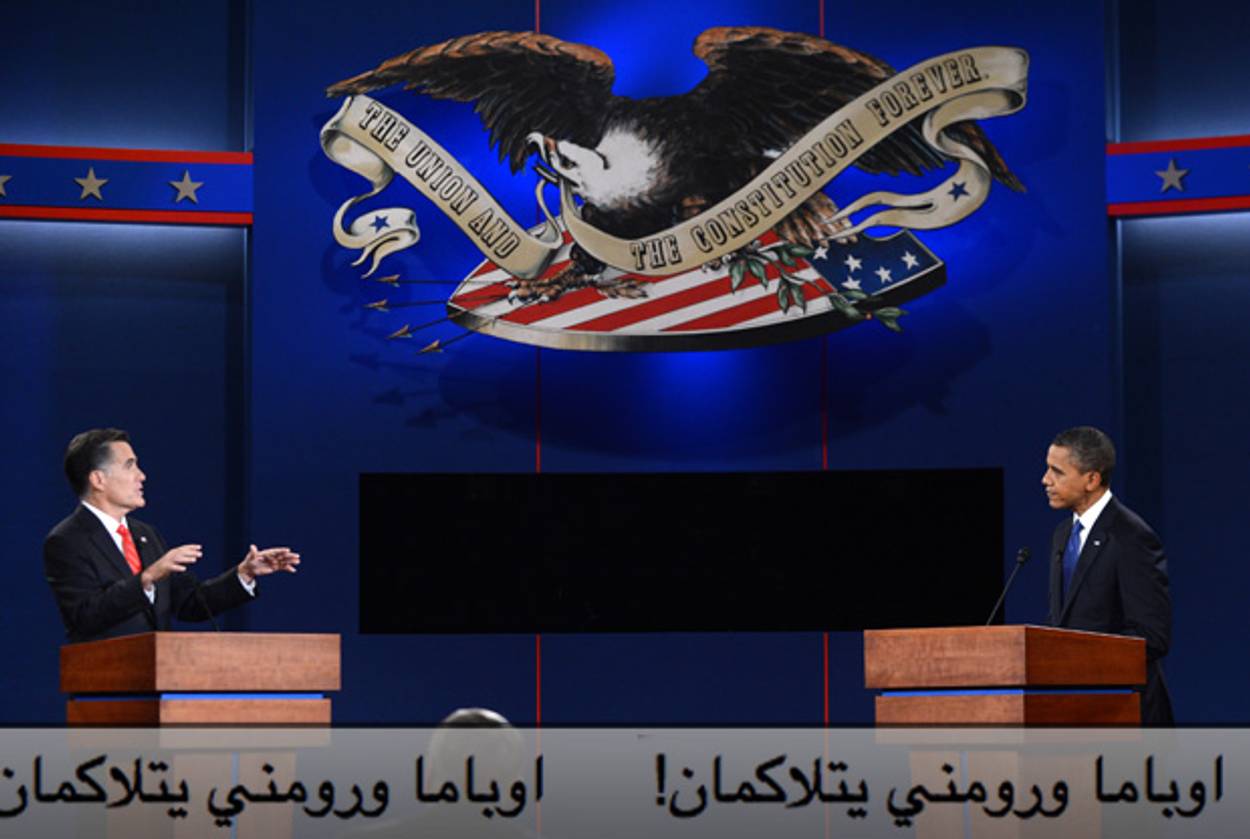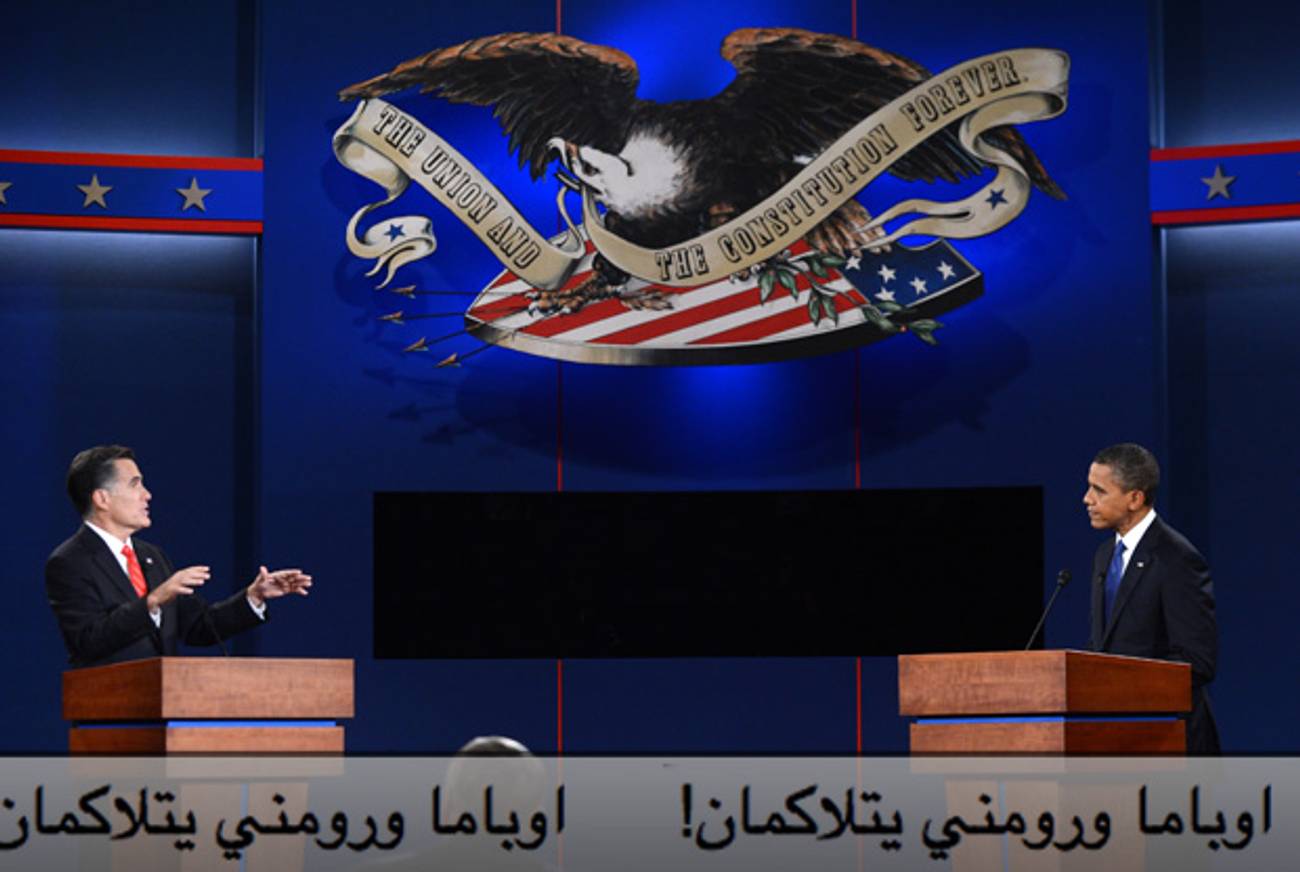Obama vs. Romney in Arabic
For years, the Arabic press promoted the conspiracy that Jews fixed U.S. elections. That’s changing.




The prevalent view of American politics in Arab countries—fostered for decades by dictators and the media they controlled, and by non-state actors like al-Qaida—was long thus: Democrats and Republicans are two sides of the same coin, and anyway the elections are all fixed by Jews. Even as recently as March 2005, when Iraq held its first credible elections, media across the region attempted to persuade Arab publics that the ballots there were fixed as well.
But Arab elites who promoted such views knew that, to the contrary, power in the United States is fluid, and no single interest group controls the electoral system. Some of them knew this because they had helped sway American elections themselves: Members of the Saudi royal family made no secret of their friendship with the Bush family and reportedly lowered global oil prices in 2004 to assist the U.S. economy and ensure the reelection of George W. Bush. Non-state actors have also tried to sway American politics: Osama Bin Laden famously released a video in October 2004 that appeared to endorse John Kerry—a “kiss of death” from America’s enemy No. 1 that Kerry memorably blamed for his narrow loss to Bush. Affiliates of the Muslim Brotherhood in the United States campaigned openly to persuade American Muslims to vote against the Gore-Lieberman ticket in 2000—by most accounts due to revulsion at the idea of a Jewish vice president—and subsequently took credit for tipping the scale in that election against the Democrats in swing states. Meantime, Brotherhood media in the Arab world persisted in alleging that only Jews choose America’s president.
But this year, some of the most popular Arabic coverage of the Obama-Romney race stands in stark contrast to the cynical reportage of the past. Broadcast and print media across the region have been featuring substantive pieces on the American elections, typically based on a close reading of American media or interviews with American politicians and voters. The wherewithal to do so has been building for years with the spread of Arabic satellite television and online media beyond the control of authoritarian states. But over the past 18 months, amid revolution and free elections in Tunisia, Egypt, and Libya, demand for reliable coverage of elections everywhere appears to have reached new heights.
Take journalist Abdullah Khalifa Al-Shayji’s recent two-part piece in the widely read Jordanian daily Al-Dustur. Typifying the kind of U.S. election coverage one finds in many mainstream Arab print venues these days, the series provides an overview of America’s economy and internal political divisions, a review of the two candidates’ positions on issues foreign and domestic, and a guide to the various battleground states and which way they seem to be leaning.
As in the past, there is plenty of coverage of Israeli and American Jewish efforts to influence the elections. But this time, it’s less conspiratorial. A large portion of it focuses on Israeli Prime Minister Benjamin Netanyahu’s attempt to press Obama on Iran and does not differ markedly from some American reporting on the topic. An article in the UAE daily Al-Khaleej, one of the few pieces I found in the Arabic press that mentions Jewish casino mogul and Romney mega-donor Sheldon Adelson, groups him together with other wealthy Republican donors such as the Koch brothers and shopping center magnate Mel Sembler. It uses the term “shadow groups,” coined by the American left, to refer to their behind-the-scenes influence and notes Adelson’s support for settlements in the West Bank and Gaza. But both in content and tone, it reads like coverage of the convention on Pacifica Radio: In fact, parts of it appear to have been lifted almost verbatim from this transcript of Amy Goodman’s Democracy Now. All of which is to say that today’s Arabic coverage is considerably less inflected with the region’s more retrograde cultural tropes and has instead embraced the mundane style of political coverage that one finds in the West. Last week’s presidential debate garnered dozens of sober blow-by-blow accounts in newspapers regionwide—and even a handful of New York Post-like headlines, like this one on the website of Al-Arabiya: “Romney Debate Ruins Romantic Dinner for Obama and Michelle!”
As in years past, there are still plenty of media treatments of the elections that dismiss them as bread and circuses. Tellingly, however, this material often comes from non-Arab sources whose purpose is to stoke anti-Americanism in the Middle East. For example, a piece claiming that Obama and Romney are “two sides of the same coin” ran in the Arabic-language edition of Russia Today, a broadcast network controlled by the Russian government. An article in an Egyptian online magazine, serving up the old chestnut that Jews alone select America’s president and the elections are merely a show, was based on an interview with the chief of staff of the Iranian military.
And foreign influence cuts both ways. Some of the most nuanced coverage of the U.S. election has been penned by Arab journalists who observed the Republican and Democratic national conventions first-hand as guests of the U.S. State Department. “We fly them in and put them up, and give them an opportunity to see how these things work,” explained Susan Pittman, director of media relations for the Educational and Cultural Affairs bureau, in a phone conversation with me. “They attend the candidates’ fundraising events. They learn about campaign strategy and the transparency of the whole process.” Judging from high-quality Arabic-language content in Egypt and the Palestinian territories that came out of the journalists’ visits to Tampa and Charlotte, the State Department’s program has been a success.
Meanwhile, the vast Arab audiences that consume all this coverage are being affected by it in perhaps unexpected ways. Realizing that the American electorate may actually be open to persuasion about which candidate to pick, some Arabs want to weigh in themselves. On Facebook, I found a photograph of a large placard in English, hoisted by a group of rebels in west-central Syria, that appears to endorse Mitt Romney: “OBAMA’S PROCRASTINATION KILLS US: WE MISS BUSH’S AUDACITY. THE WORLD IS BETTER WITH AMERICA’S REPUBLICANS.” The young people who painted this poster apparently felt that the president was not doing enough to help them beat Bashar al-Assad and took the trouble to convey their message in a language American voters could read.
Columnist Ubaydli Ubaydli, writing in the Bahraini daily Al-Watan, sees more powerful tools of electoral influence at the region’s disposal. “[Arabs] hold strong cards, if they use them smartly … that Jewish pressure groups in the United States would find it hard to compete with,” he writes. Citing the presence of American Muslim voters in swing states like Florida, Gulf nations’ vast holdings in the American economy and capacity to affect the price of oil, and the fact that the Gulf hosts American military bases, he calls for a coordinated strategy to harness these assets to affect American politics—though he does not make clear what the intended impact would be.
Ubaydli’s ideas are not new to ruling elites in the Gulf who read Al-Watan. To the extent Gulf rulers use such tools like oil-price fixing, as Saudis have in the past, they would probably put them at the service of the Republican Party. “There is a broad consensus here that Romney would be better for us,” Abdullah Elmadani, a royalist intellectual in Bahrain with ties to the monarchy, told me. Elmadani noted the Gulf sheikhs’ enduring gratitude to Republicans for liberating Kuwait, their hawkish stand on Iran (known thanks to Wikileaks cables), thinly veiled anger at the Obama Administration for abandoning Egyptian president Hosni Mubarak last year, and sympathy for the plight of Syria’s rebels. Yet Gulf rulers’ internal deliberations are notoriously opaque, which invites speculation as to why the Bahraini kingdom would allow Ubaydli’s piece to run in a newspaper it controls. Perhaps it amounts to a warning of sorts.
But while elites in the Gulf favor Romney, others in the region prefer the incumbent. Speaking on condition of anonymity, a senior Brotherhood source told me that the movement’s affiliates in the United States understandably regret their support for George W. Bush in 2000 and recognize that their unpopularity among Americans means that any expression of support by the Brotherhood for a given candidate would only hurt him. Nonetheless, R’hayyil Gharaibeh, chief of the Jordanian Muslim Brotherhood’s political bureau, told me his preference: “Of course Obama is better,” he said. “He is a big improvement on Bush in terms of the tone of his rhetoric and his decision to withdraw troops from Iraq and Afghanistan.” My sense from travel and reporting in North Africa and the Middle East since the Arab Spring is that most Arab Muslims share Gharaibeh’s preference to see Obama win this November—and that some will find ways to say as much in English in the remaining weeks of the campaign.
Arabs’ growing recognition that American power is fluid probably owes something to the novelty of free elections in Egypt, Libya, and Tunisia. The natural human tendency to project one’s own reality onto others means that a person living under tyranny would be more likely to believe that America, too, is unfree—whereas newly liberated societies can more easily reexamine the United States with an open mind. Last month’s tragedy in Libya reminded Americans how little even a superpower can do to affect the course of distant peoples. Yet the reverberations of our domestic politics in the Arab world this season demonstrate that the power of our example may have a greater impact than we know.
***
Like this article? Sign up for our Daily Digest to get Tablet Magazine’s new content in your inbox each morning.
Joseph Braude is an author, broadcaster, and Middle East specialist. He is working on a book about Arabic media.
Joseph Braude is an author, broadcaster, and Middle East specialist. He is working on a book about Arabic media.